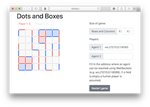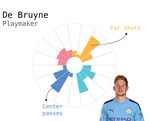Can computers create jokes?
Computational humor Can computers be funny? Certainly your virtual assistant (e.g. Siri or Alexa) is able to tell a joke if you ask for one, but these are of course pre-written, human-made jokes.
Synthesising Inductive Data Models
The goal is to automate the task of the data scientist when developing intelligent systems, which is to extract knowledge from data in the form of models. It wants to develop the foundations of a theory and methodology for automatically synthesising inductive data models using artificial intelligence, data mining, machine learning and probabilistic methods.
ProbLog: Probabilistic Logic Programming
Probabilistic programming studies probabilistic extensions of programming languages that can be used to model rich domains. The lab has contributed a probabilistic extension of a Prolog, called ProbLog.
ML Student Projects: Dots-and-Boxes
This games was explored in the course “Machine Learning: Project” (Prof. Hendrik Blockeel, Dr. Wannes Meert). Students developed agents that are able to play the Dots-and-Boxes game.
The game implementation is available at https://github.
Player vectors: Characterizing soccer players' playing styles
A player’s style of play is a reoccurring concept when discussing soccer as each player approaches the game in a different way. Unfortunately, playing style is inherently a subjective and nebulous concept, which makes it difficult to capture it in a data-driven manner. This post gives an intuitive explanation of our recent ECMLPKDD 2019 paper on this topic, provides illustrative use cases and introduces a small interactive demo.

